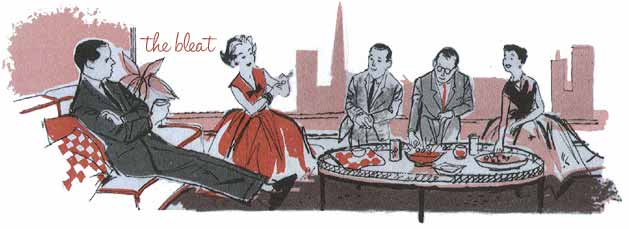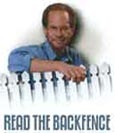
|
. |
 Watched the entire Star Wars DVD series this weekend. The virtues of the DVD consist of the meticulous slicing of the films into minute, easily avoided portions. For example, when it came to the Yoda scenes on Dagobah: skip them I did. Likewise most of the Ewokery in Ep 6. Watching the movie on my monitor, with my left hand on the device I use for editing movies, I was able to instantly edit Ep 6 to my desires, and it made for a much more enjoyable movie. Watched the entire Star Wars DVD series this weekend. The virtues of the DVD consist of the meticulous slicing of the films into minute, easily avoided portions. For example, when it came to the Yoda scenes on Dagobah: skip them I did. Likewise most of the Ewokery in Ep 6. Watching the movie on my monitor, with my left hand on the device I use for editing movies, I was able to instantly edit Ep 6 to my desires, and it made for a much more enjoyable movie.It’s the only one that makes sense from a strategic point of view, too. Consider the logic in Ep. IV: “Okay, fellow rebels, here’s the deal. To destroy the Death Star, we have to fire some explosive devices down a small port that has the the diameter of a toad nostril. Any ideas?” Sir, I suggest we group the X wings into seven waves, each of which will dive directly down towards the port and fire torpedoes into the shaft. "Hmm. Direct, simple to execute. Intriguing. Anyone else?" Sir! Why not start our approach 800 kilometers meters away from the port? We could fly through the trench, drawing fire from the turrets and the TIE fighters, then fire the torpedoes at the last minute and hope they drop down the hole? "Brilliant, Porkins! I like your thinking!" It’s the same in Ep V. As much as we all love the Imperial walkers, would they be your first choice for attacking a base on an ice planet? Slow elephantine top-heavy four-footed machines on ice, fer chrissakes. Nuke the joint from orbit and call it a day. Episode VI isn’t just more logical, it’s better acted – mostly because there’s not much acting at all. Mark Hamill doesn’t do Confident Jedi Solemnity very well; he just looks like a kid trying not to snicker in church. Harrison Ford – well, I think he is attracted to his carpentry hobby for the same reason Lucas chose him for the role. They both like working with wood. Carrie Fischer lost the posh accent and 25 pounds, and the result was rather homely by the third go-round. (It's a testament to Male Priorities that all the geeks remembered the metal bikini and forgot the jaw-droppingly horrid "blues" song crooned in Jabba's throne room. It makes the Cantina tune sound like a Schubert lieder. ) In Episode IV and V, anyone who wasn’t fur-faced, rubber-headed, metallic, or British came off poorly. Yoda had more acting chops than anyone else. Billy Dee Williams is awful, for example – but he’s great in Ep VI, because all he has to do is squint and move levers and shout YEEAAAHHH at the right moment. Which brings us to the fuganewocks. As someone once said, no matter how cool you think Star Wars is, it begins with Jar Jar and ends with Ewoks. I remember sitting in the theater 21 years ago listening to that horrible closing song, fighting the overwhelming realization that Lameness had swamped the boats and sunk the fleet. But: in the new version, there’s a better song. A new-agey anthem for liberation and freedom, I guess. They added scenes from various locales across the Empire – Naboo, Cloud City, Coruscant. Impressive, as a black-clad asthmatic once remarked. For some reason, it imparted the notion of triumph and liberation better than the Teddy Bear’s Kegger song we had before. FX for VI are better, too. But I had the darkness turned down on my set, and when a TIE fighter flew past, what did my eyes behold:  Excuse me, Mr. Lucas? EXCUSE ME? After all these years, after all the digital cleaning and retouching, we can still see the reside of the compositing? EXCUSE ME, SIR, but I can only deduce you left it in so you could clean up one scene for the Blu-ray HD s movie edition. Why I don’t I just pay you for that one now, okay? It’s going to happen. Might as well get it out of the way. Do you take Amex? Fine, then. You can’t read everything when you’re in the 20s. Just the basics. In your 30s, I think, you read the popular stuff, exciting novels with twists and turns and ludicrous plots. I traveled more in my 30s, and hence consumed too many brand-name novels stacked up in airport giftshops. You had your Clancys, books you did not so much read as chew like a thick steak. There were the spooky books, which you flew through like wind through a screen door. And for a while I read crime novels until I tired of brilliant-but-mad men who were Manhattan opthamologists by day but sexually neurotic serial killers by night. And then I stopped reading altogether – the child came along, I didn’t travel much, and the opportunities for soaking up a book in three or four days evaporated entirely. Now I’m reading again, and like many in their 40s, it’s non-fiction. The real world is more interesting than the manufactured ones, with all its tricks and gimmicks. By now I’d rather read a biography of the man who typeset “Les Miserables” than read the book again. Last month it was Joe Mitchell; this month it’s A.J. Liebling. Or at least it’s supposed to be. I suppose I should blush for not reading him sooner, since he’s one of those names journalists throw around to prove that the scribbler’s craft can produce true artists. He wrote for the New Yorker in the 30s, 40s and 50s, and was one of those chroniclers of the demi-monde of gyms and bars. Or so the reputation has it. Well, I’ve been dipping through “Just Enough Liebling,” and I don’t get it. I just don’t. Part of the problem is that he writes long detailed pieces about food, and food writing bores me. (Unless I am the one doing the writing.) The attention to gustatory detail can seem unseemly, after a while. All that talk of sauces and obscure drizzles and precious pates and brash herbs - please. It's just dinner. There's a difference between describing the charms of one's first love and going on and on about the interesting pattern of moles on a hooker's back. The introduction, by David Remnick, may have spoiled me for good. “From the start of the American republic,” Remnick writes, “the most tantalizing means of indulging a youthful desire for escape and recreation has been the sojourn in Paris.” Uh – well, in your circle, sir, perhaps. “Much is promised to the prospective traveler: if not a passage of enlightenment or erotic adventure, then at least a taste for boiled innards and string beans done right.” I remember growing up in Fargo, and how I couldn’t wait for the day when I could hop a jet, land at Le Bourget, stroll down the Champs Elysee and order some haggis. Remnick mentions France because he was first introduced to Leibling’s work in a Paris bookstore. Liebling spent a lot of time in Paris, and his work is girded by a love of France and a distrust of German nannies - or so the introduction suggests. Fine, but this doesn't exactly have the sort of cosmic resonance Remnick takes forr granted. On the contrary. One of the first pieces is a foodie aria called “Just Enough Money,” and it begins thus: “If, as I was saying before I digressed, the first requisite for writing well about food is a good appetite, the second is to put in your apprenticeship as a feeder when you have enough money to pay the check but not enough to produce indifference to the size of the total. (I also meant to say, previously, that Waverly Root has a good appetite, but I never got around to it.)” That’s the work of someone who’s entered the coasting period of his career; why put it at the front of the book? I mean, it’s not bad, it’s just not the brilliance I had been expecting. (Waverly Root was a contemporary of Liebling, another food writer.) I’ll read on, but I have to tell you: the foreward to the book may have scotched it for good. Remnick ends the forward with Liebling's death at 59, and says: “His last words were French.” What they were, he doesn’t say. Why this matters, he doesn't explain. Is it clear to you? It's not clear to me. Anyway, I’ll read more, and get back to you. For now, Mitchell’s still my man. Two columns to write, and I’m still working at 67% here; see you tomorrow. (Oh, and new Fence as well.) |
|
|
|
.....


